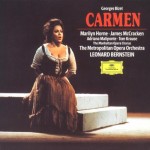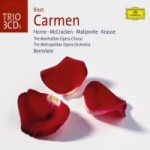1972, Deutsche Grammophon
(Marilyn Horne, James McCracken, Tom Krause, Adriana Maliponte; Manhattan Opera Chorus; Metropolitan Opera Orchestra, cond. Leonard Bernstein)
Here we have yet another uneven Carmen that I can’t help but enjoy despite its flaws. Genius though Leonard Bernstein was, not everyone will approve of his eternally slow tempos and punchy dramatic climaxes here, or his use of the controversial Oeser edition with its array of departures from the traditional score. Nor will every listener appreciate the singers’ performances. This is a very American Carmen, both in accent and in atmosphere: unabashedly brash and characterized by loud, messy emotionalism. Yet there lies its appeal for me. From start to finish, this recording surges with theatrical flair. Each performer infuses the music and dialogue alike with character, and while the results are sometimes over-the-top and lacking in elegance, the drama is undeniably brought to life.
Eighteen years after dubbing Dorothy Dandridge’s singing in Carmen Jones, Marilyn Horne assumes the role proper of Carmen in an unforgettable performance. The voice that was so light and delicately seductive in the classic film has matured into the Horne sound more familiar to most opera lovers: a creamy, full-blooded, powerful mezzo that exudes strength and passion. A conventionally “sexy” sound it isn’t, but still it’s glorious, and it perfectly suits her characterization of a wild, laughing vagabond woman with tremendous zest for life and a red-hot iron will. Her Don José, James McCracken, fairs slightly less well: with his big, thick, ringing, sobbing tenor, he’s the type of verismo-style José deplored by critics who long for old-school French finesse. (Though he manages to sing the high B-flat in the Flower Song pianissimo, he only does so by resorting to falsetto.) But all the same, it’s hard not to be affected by the raw rage and pain of his heart-on-the-sleeve characterization. Tom Krause is a charming Escamillo with a smooth and attractive if sometimes heavy tone, while Adriana Maliponte’s Micaela is decent but nothing special, her spinto voice creamy but not very sweet. The supporting cast ranges from strong (Donald Gramm’s Zuniga, Colette Boky’s Frasquita and Marcia Baldwin’s Mercedes) to mediocre (e.g. Russell Christopher’s hammy, leaden-voiced Dancaïre).
I understand why some critics disdain this Carmen, but as far as I’m concerned it’s still worth hearing. While far from definitive, it still captures the lively, passionate heart of Bizet’s masterpiece.






Mirto_P
August 30th, 2013 at 16:23
I saw a couple of performances in the first run of Met performances this (studio) recording was based on, and in the house Bernstein’s conducting seemed positively revelatory and had enormous impact. But I never thought the unique sound he conjured up for this opera translated properly to the recording. The production – spare and gray but *brightly* lit – seemed positively radical for the Met at the time (no ‘gypsy’ kitsch in sight) and remembering it makes me wonder again what the Met in the 1970s would have been like had this production’s original director (it was recreated for the Met by an assistant) Goeran Gentele not been killed in a car accident just prior to succeeding Rudolf Bing as Met general manager. It premiered on opening night of what would have been Gentele’s first season as GM. (Gentele had wisely subbed in his own Carmen for the occasion, scrapping a Bing-planned opening with a rather tired old Tannhauser production.)
Pamina
August 30th, 2013 at 17:45
I wish I could have seen that production! I don’t know if I would have loved it or not, but judging by the recording and the few photos I’ve seen, I’m sure it wasn’t boring! I think if this recording has one advantage among studio “Carmen”s, it’s that it’s based on a real production and the cast and conductor had all worked together onstage. That’s probably why it has a real theatrical spark.
Thomas Mowrey
June 3rd, 2015 at 00:59
Thanks, Pamina. I produced this recording for Deutsche Grammophon, and throughout the recording a post-production mixing process, I always had the stage production in mind. Preserving the “real theatrical spark” was one of my primary objectives. Glad you “got it”!
– Thomas Mowrey, 6/2/15
Pamina
June 15th, 2015 at 06:16
I’m glad I did too. Thanks for stopping by! I’m honored.
Thomas Mowrey
July 22nd, 2015 at 16:23
I just now came upon your reply, Pamina. As an afterthought, I wanted to tell you that this recording has recently been re-released in my original surround-sound mix by Pentatone. If you have access to an SA-CD player connected to a surround-sound setup, I think you would enjoy it.